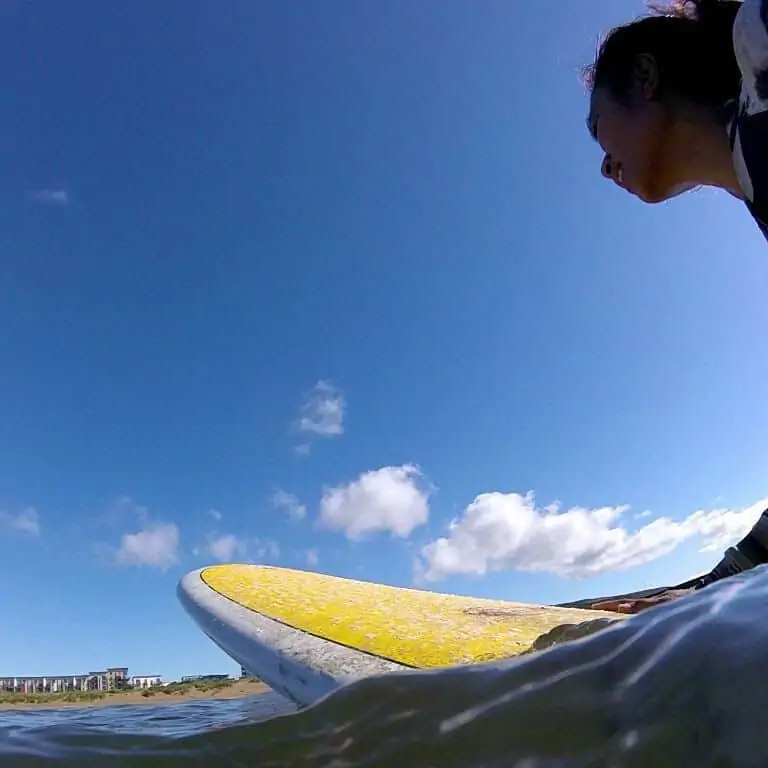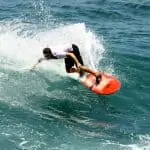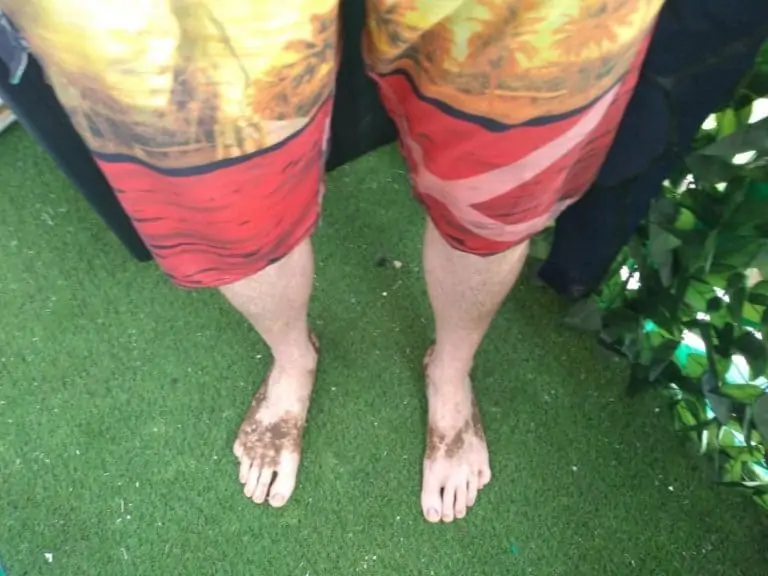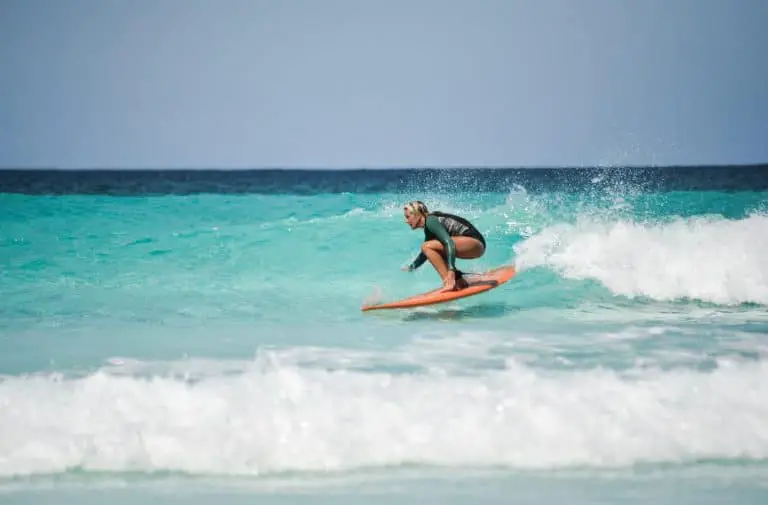Can You Learn to Surf at 40? (YES – Here’s How!)
If you’re thinking about learning to surf when you’re over 40, you might worry that you’re arriving too late to the game.
That you’ll struggle to learn the skills you need, that you’ll make a fool of yourself and that all those other younger, fitter surfers will just laugh at your ineptitude and clumsiness and ignore you.
But this certainly isn’t true.
Can you learn to surf at 40? Absolutely, provided that you have a moderate level of physical fitness and flexibility. Learning to surf is mainly about commitment, so provided you are willing to keep trying, you can definitely learn to surf at that age.
To start learning to surf at 40+, sign up for a beginner’s surf lesson, get fit, improve your swimming skills, find the right surfboard and make sure you’re not comparing yourself to others. Before you know it, you’ll be out there enjoying those waves!
Surfing doesn’t come with an age limit and it’s never too late to get started (even if you’re over 40!)
More than that, it’s a fantastic way to stay fit, boost your mood, challenge yourself and feel younger for longer.
If you don’t believe me that it’s possible, check out the video by Jeremie Hollier in France, having a blast after learning to surf in his 40s!
I’ve put together this guide to learning to surf at 40 to help answer your questions and give you some encouragement along the way. I’ll cover some of the benefits of this fun, outdoors sport and give you a step by step guide that will help you get started.

Tips for learning to surf at 40
1. Get in shape
Surfing at any age can be very physically demanding, especially when you’re older.
You’ll need to use your entire body as you paddle out, pop up on your board and control your body as you ride those waves. You’ll also be out there for long periods of time so you need to have enough stamina to keep you safe.
That’s why you should start by getting more active and work on your fitness. The fitter you are, the easier it will be for you to learn to surf.
Having said that, you don’t need to be at a marathon level of fitness when you’re first learning, but every little helps. Here are some tips:
- Work on your cardio fitness. Go for long walks, start running, get onto your bike or even run around with your kids.
- Focus on functional strength. You’ll need decent core strength if you want to maintain control and decent arm strength for paddling.
- Remember to stretch. Include stretching, flexibility and balance into your routine to help you prevent injury and give your surf skills a head start.
Most of these exercises for surfing you can do from the comfort of your own home. Just fire up YouTube and you’ll find tons of online workouts that will get you in shape fast.
2. Book a surf lesson
Whilst you absolutely could teach yourself to surf, it’s usually best to sign up for at least one proper beginner’s surf lesson, especially when you’re first getting started.
These can be worth their weight in gold for beginners aged 40+ as they give you plenty of confidence in your budding skills whilst also helping you improve your technique. You’ll also learn proper surf etiquette and develop better ocean awareness too.
Make sure you don’t just settle for the first surf school you find, though. Ask plenty of questions and look at reviews to find the best option for you.
If your budget is tight and you already have surfing buddies, ask them to take you out in exchange for a few beers. Most surfers will grab the opportunity to share their love for the ocean.
3. Tune up your swimming skills
If you don’t know how to swim, close your computer right now and sign up for some swimming lessons. Seriously! There’s absolutely no way you’ll stay safe in the ocean if you’re not a strong swimmer.
It’s important to remember that the sea is an incredibly powerful force.
Waves and currents can be strong and sea conditions can change in the blink of an eye and leave you in a dangerous situation so being able to swim is an imperative. You must be able to take care of yourself and get yourself to safety.
To start learning, you don’t need to be a really strong swimmer as you’ll usually start your lessons in relatively shallow water). But if you want to progress beyond an absolute beginner stage, it’s essential.
Practice makes perfect so aim to swim in the ocean as much as you can. This will provide more authentic conditions than if you just went to your local swimming pool and it will give you more confidence about ‘wild swimming’.
4. Choose the right surfboard for beginners
When you get started, make sure you choose the right surfboard for a beginner like you.
You need to look for longer, thicker and wider boards as they provide the most stability as the ocean so make it easier to learn. Bigger boards like funboards and longboards are great for learning to surf over 40.
Avoid those smaller boards as much as possible- these are much more difficult to manage and so can affect your confidence when you get started. Your local surf shop should be able to help you find the right size and shape surfboard for you.
5. Don’t compare yourself to others
It’s easier said than done, I know, but you must make sure you’re not comparing your surf skills to others around you.
So what if you’re taking a group surf lesson and someone in your class can pop up within 5 minutes but you’re still struggling after an hour? Maybe he or she learned to surf before and they’re just tuning up their skills. Maybe they’re naturally athletic whereas you’ve been sitting on the couch for the past few years.
Everybody is on their own unique journey.
So instead of comparing yourself with others, congratulate yourself for the fact that you’re showing up and daring to learn to surf at an age when many others wouldn’t.
Focus on your own game, be proud of your drive and determination, work hard and you will see the benefits.
It’s never too late to learn to surf and when you do, you’ll see a huge range of benefits to your mental and physical health.
What are the benefits of learning to surf at 40?
Learning to surf will transform your life for the better, especially after the grand old age of 40. Here are few of the reasons why:
1. Surfing is a great way to get fit while having fun. No more going to the dark, dank gym and sweating it out for hours on machines! You will be outside, feeling that buzz, breathing in all that fresh air and getting fit at the same time. Awesome.
2. Surfing provides an excellent cardio workout. All that paddling, popping up and riding will get your blood flowing, make your heart work hard and get you in great shape.
3. Surfing is a great way to make friends. It’s harder to grow your social circle when you’re over 40. But when you surf, you become part of a close-knit community who’ll watch your back and be there for you when you need it.
4. Surfing helps to keep those aches and pains away. When you get regular exercise such as surfing, you’ll get stronger overall, your joints will become less achy and you’ll become more flexible. This is the perfect antidote if you have to sit at your desk all day or you’ve found yourself groaning as you stand up lately!
5. Surfing is great for your coordination. Learn to surf and you’ll notice how much better your motor skills are. This will pay off big style if you take part in other sports and it will help you to age more gracefully too.
6. Surfing lifts your mood. All that natural daylight exposure, fresh air, exercise and community spirit will get your endorphins flowing, lift your mood and according to several studies, even ease your anxiety and depression.






